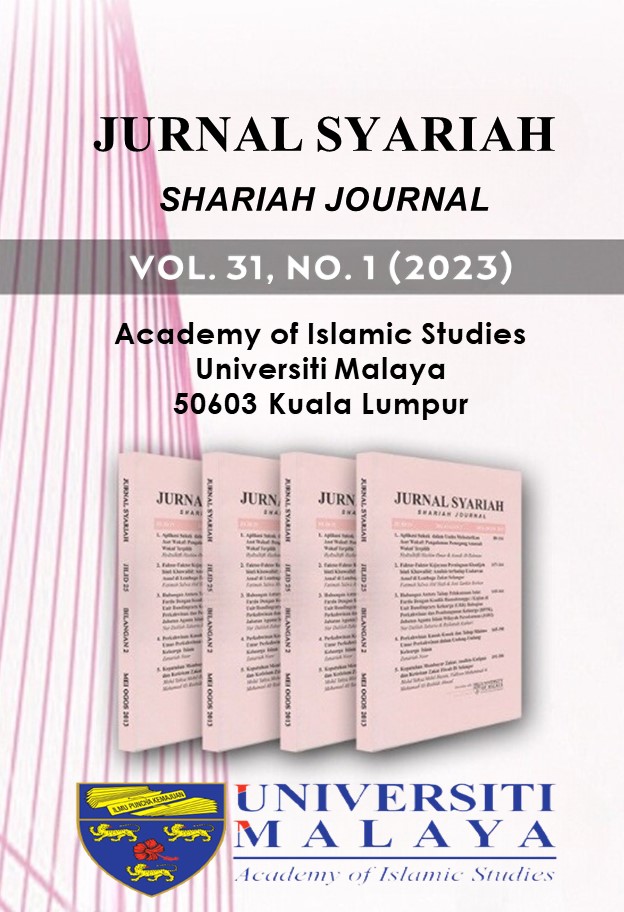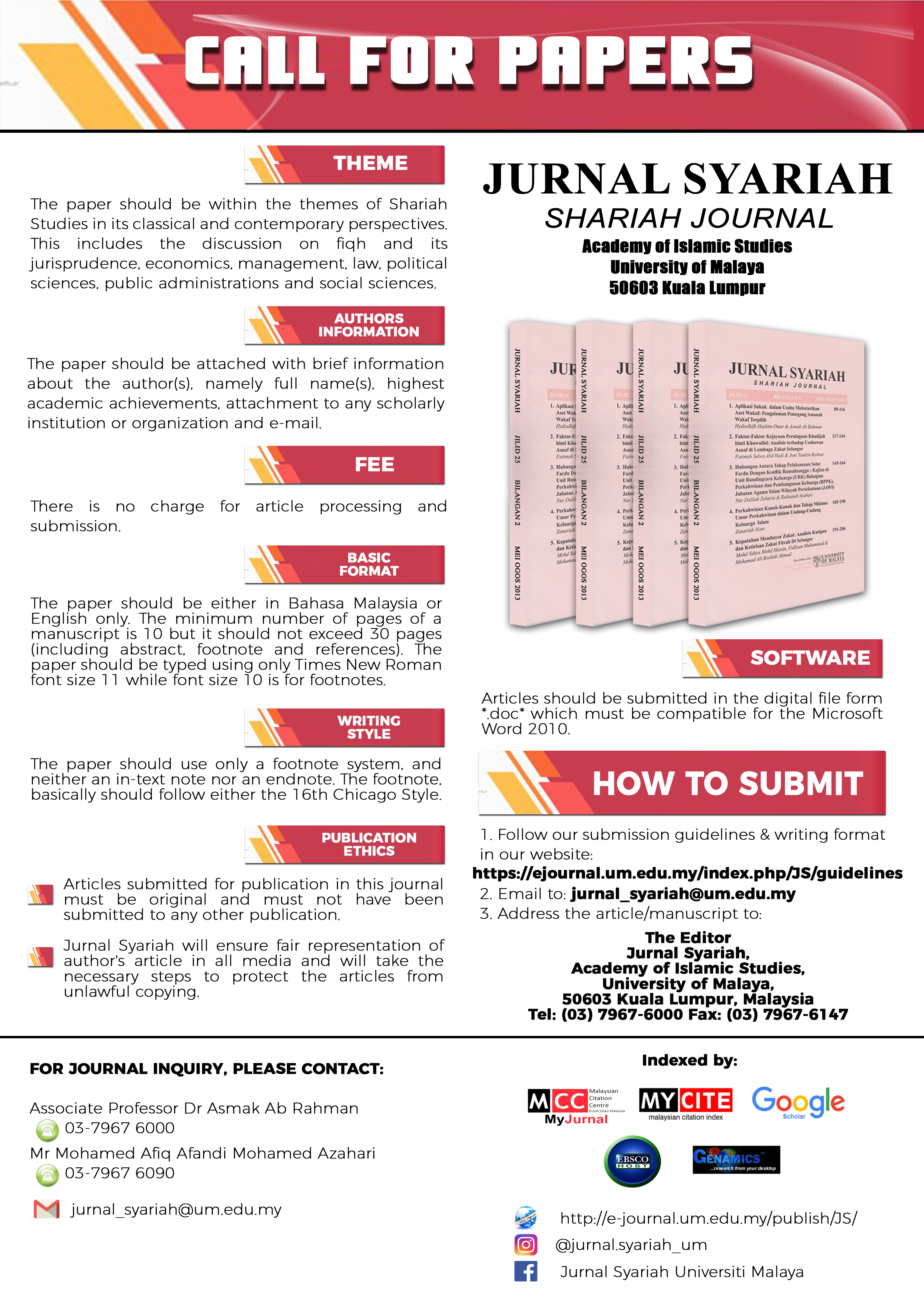APPOINTMENT OF FEMALE AS A QĀḌI (JUDGE) OF SHARI‘AH COURT OF APPEAL IN NIGERIA: A GENDER BATTLE OR RELIGIOUS STANCE
DOI:
https://doi.org/10.22452/syariah.vol31no1.4Keywords:
female, Qadi, appointment, Shari‘ah court of appeal, Nigeria, Malik madhhabAbstract
The appointment of the justices is well provided for under the Nigerian constitution. However, appointment of a female as a Qāḍi of the Shari‘ah Court of Appeal in Nigeria, faith-based adjudicatory process, has remained a thing of divergence among scholars. Therefore, this article investigates whether it is permissible for a female to be appointed as a Qāḍi of the Shari‘ah Court of Appeal in Nigeria. In carrying out this research, a doctrinal method is employed which includes analysis of primary and secondary data. It then argues that the appointment or otherwise of a female as a Qāḍi should not be categorized as a gender battle, but rather a religious position, depending on the madhhab (School of Law) a given country adopts. Drawing from jurisdictions like Malaysia and Pakistan, the paper finds that a female can become a Qāḍi of the Shari‘ah Court and hold high-ranking positions in the court as there is no explicit prohibition of such appointment in the fundamental sources of Islamic Law.
Downloads
References
Abdulkadir Imam (A Judge of Area Court, Ilorin, Kwara State), in interview with the author, 27 October 2023.
Abdulmumini Adebayo Oba, ‘The Shari‘ah Court of Appeal in Northern Nigeria: The Continuing Crises of Jurisdiction,’ American Journal of Comparative Law, vol. 52/4 (2004)
Abdulrazaaq Owolabi Abdulkadir (Associate Professor, Department of Private and Property Law, Faculty of Law, University of Ilorin-Nigeria), in interview with the author, 30 October 2023.
Abu ‘Abd Allah Muhammad bin Yazid al-Qaziwayni Ibn Majah, Sunan Ibn Majah, vol. 2 (Riyād: Maktabah al-Ma‘arif li al-Nashr wa al-Tawzi‘, n.d.).
Anjum Gulnaz, ‘Women's Activism in Pakistan: Role of Religious Nationalism and Feminist Ideology Among Self-Identified Conservatives and Liberals’, Open Cultural Studies, vol. 4/1 (2020): 36–49, doi:10.1515/culture-2020-0004.
Asein John, Introduction to Nigerian Legal System (Lagos: Ababa Press Ltd., 2005).
Asma Barlas, "Believing Women" in Islam: Unreading Patriarchal Interpretations of the Qur'an (Austin: University of Texas Press, 2002).
Azuh Dominic, Eghareva D. Mathew. & Azuh E. Akunna, ‘Gender Discrimination and National Politics: The Nigerian Case,’ Covenant University Journal of Politics and International Affairs, vol. 2 (2006).
Brescoll Victoria & LaFrance Mariane, ‘The Correlates and Consequences of Newspaper Reports of Research on Sex Differences,’ Psychological Science., vol. 15 (2004).
Constitution of the Federal Republic of Nigeria, 1999 (as amended).
Danjuma Safiya, Muhammad Yusuf & Alkhali Larai F, ‘Factors Militating Against Women and Economic Empowerment and Poverty Reduction in Africa Countries,’ Journal of Business and Management, vol. 13/6 (2013).
Engy Abdelkader, ‘To Judge or Not to Judge: A Comparative Analysis of Islam Jurisprudential Approaches to Female Judges in the Muslim World (Indonesia' Egypt and Iran),’ Fordham International Law Journal, vol. 37/2 (2014): 307-372, http://ir.lawnet.fordham.edu/cgi/viewcontent.cgi?article=2329&context=ilj, accessed on 18 August 2023.
Fadilah Abd Rahman, Noorul Huda Sahari & Sharifah Zaharah Syed Mohamed, ‘Appointment of Female Judges in The Syariah Courts of Malaysia: A Study of the Perception of The Society and Legal Practitioners,’ (Final Report Project, Universiti Teknologi MARA, Selangor, April 2006), 56, https://www.academia.edu/2225036/
Fariba Zarinebaf-Shahr, ‘Women, Law and Imperial justice in Ottoman Istanbul in the Late Seventeenth Century’, in Women, the Family and Divorce Laws in Islamic History, ed. Amira El Azhary Sonbol (n.p: Syracuse University Press, 1996).
Hanafi A. Hammed, Islamic Law of Evidence and Administration of Justice in Nigeria (Lagos: Princeton and Ass. Pub. Co., 2022).
Ibn ‘Aṣim al-Andalusiy, Tuḥfah al-Ḥukkam fi Nakti al-‘Uqūd wa al-Ahkam (Qahirah.: Dār al-Afāq, 2011).
Imām Hāfiz Abū ‘Īsā Mohammad Ibn ‘Īsa al-Tirmidhi, Al-Jami‘ al-Tirmidhi, vol. 5 (Riyād: Maktabah Dār al-Salām, 2007).
Ismail Adua Mustapha (Associate Professor, Department of Business Law, Faculty of Law, University of Ilorin-Nigeria), in interview with the author, 26 October 2023.
Jam Ejukonemu, ‘Gender Role in Contemporary Nigeria Society,’ International of Social Science and Economic, vol. 1/1 (2018): 22-28.
Al-Kasani Abu Bakr ‘Ala’ al-Din, Badā‘i al-Sanā‘i fi Tartīb al-Sharā‘i (Bayrut: Dar al-Kutub al-‘Ilmiyyah, 1976).
Kirmani Nida & Khan Ayesha, ‘Moving Beyond the Binary: Gender-based Activism in Pakistan’, Feminist Dissent, vol. 3 (2018).
Leila Ahmed, Women and Gender in Islam: Historical Roots of a Modern Debate (New Haven: Yale University Press, 1992).
Lukman M. Shafii (Director Civil Right and Development Resource Center, 12b, Western Reservoir Road, Olorunshogo Area, Ilorin, Kwara State), in interview with the author, 26 October 2023.
Mas’ud Adebayo Oniye (Qadi Shari‘ah Court of Appeal, Kwara State), in interview with the author, 2 October 2023.
Miriam Cooke, Women Claim Islam: Creating Islamic Feminism Through Literature (New York: Routledge, 2001).
Muhammad bin ‘Ali al-Shawkani, Al-Sayl al-Jarrar al-Mutadaffiq ‘ala Hada’iq al-Azhār, vol. 4 (Al-Qahirah: Dar Ibn Hazm, 1970).
Muhammad bin Isma‘il Abu ‘Abd Allah al-Bukhari, Al-Jami‘ Saḥiḥ al-Bukhari, vol. 6 (n.p.: Dār Tawq al-Najah, 2001).
Nik Noriani Nik Badlishah & Yasmin Masidi, Women as Judges (Malaysia: Sisters in Islam, 2002), https://sistersinislam.org/wp-content/uploads/2021/10/booklet-women-as-judges.pdf, accessed on 18 August 2023.
Nikki Keddie, ‘The Study of Muslim Women in the Middle East: Achievements and Remaining Problems’, Harvard Middle Eastern and Islamic Review, vol. 6 (2000).
Nikki Keddie, ‘Women in the Limelight: Some Recent Books on Middle Eastern Women’s History’, International Journal of Middle East Studies, vol. 34/3 (2002).
Okon Donatus, ‘Gender Mainstreaming as Index of Sustainable Development in Nigeria: Problems and Prospects,’ International Journal Scientific Research in Education, vol. 9/4 (2016).
Okorie Mercy., ‘An Assessment of Factors Militating Against Girl Child Education in Nigeria,’ International Journal of Advanced and Multidisciplinary Social Science, vol. 3/2 (2017): 49-54.
Organization of Economic Cooperation Development, Women in Public Life: Gender, Law and Policy in the Middle East and North Africa (OECD Publishing, 2014), 142, https://www.oecd.org/mena/governance/women-in-public-life-mena-brochure.pdf, accessed on 12 August 2023.
Ramizah Wan Muhammad & Ahmad Muslim Rozlan ‘Women as Shari‘ah Court Judges with Reference to Judicial Creativity: A Comparative Study of Malaysia and Indonesia’, US-China Law Review, vol. 15/1 (2018): 18-28, https://www.researchgate.net/publication/327973807_Women_as_Shari'ah_Court_Judges_With_Reference_to_Judicial_Creativity_A_Comparative_Study_of_Malaysia_and_Indonesia, accessed on 18 August 2023.
Ramadan Ali Al-Sharnoubi, Consumer Protection in Islamic Jurisprudence, 1st ed. (Egypt: Al-Amana Library, n.d.).
Shaheed Farida, ‘Maintaining Momentum in Changing Circumstances’, Journal of International Affairs, vol. 72/2 (2019).
United States Department of State, Country Reports on Human Rights Practices for 2013: Pakistan 2013 Human Rights Report, https://www.state.gov/documents/organization/220614 pdf, URL not found, please give latest URL, accessed on 13 August 2023.
Al-Zayla‘i Fakhr al-Din ‘Uthman, Tabyīn al-Haqāiq Sharh Kanzu al-Daqāiq, vol. 4 (Cairo: Dar al-Kitab al-Islami, 1895).
Downloads
Published
How to Cite
Issue
Section
License
Copyright (c) 2023 Jurnal Syariah

This work is licensed under a Creative Commons Attribution-NonCommercial 4.0 International License.
COPYRIGHT: All rights reserved. Not allowed to be reproduced any part of articles and contents of this journal in any form or by any way, whether electronic, mechanical, photocopying, recording or otherwise without permission in writing from the Chief Editor, Jurnal Syariah.



















